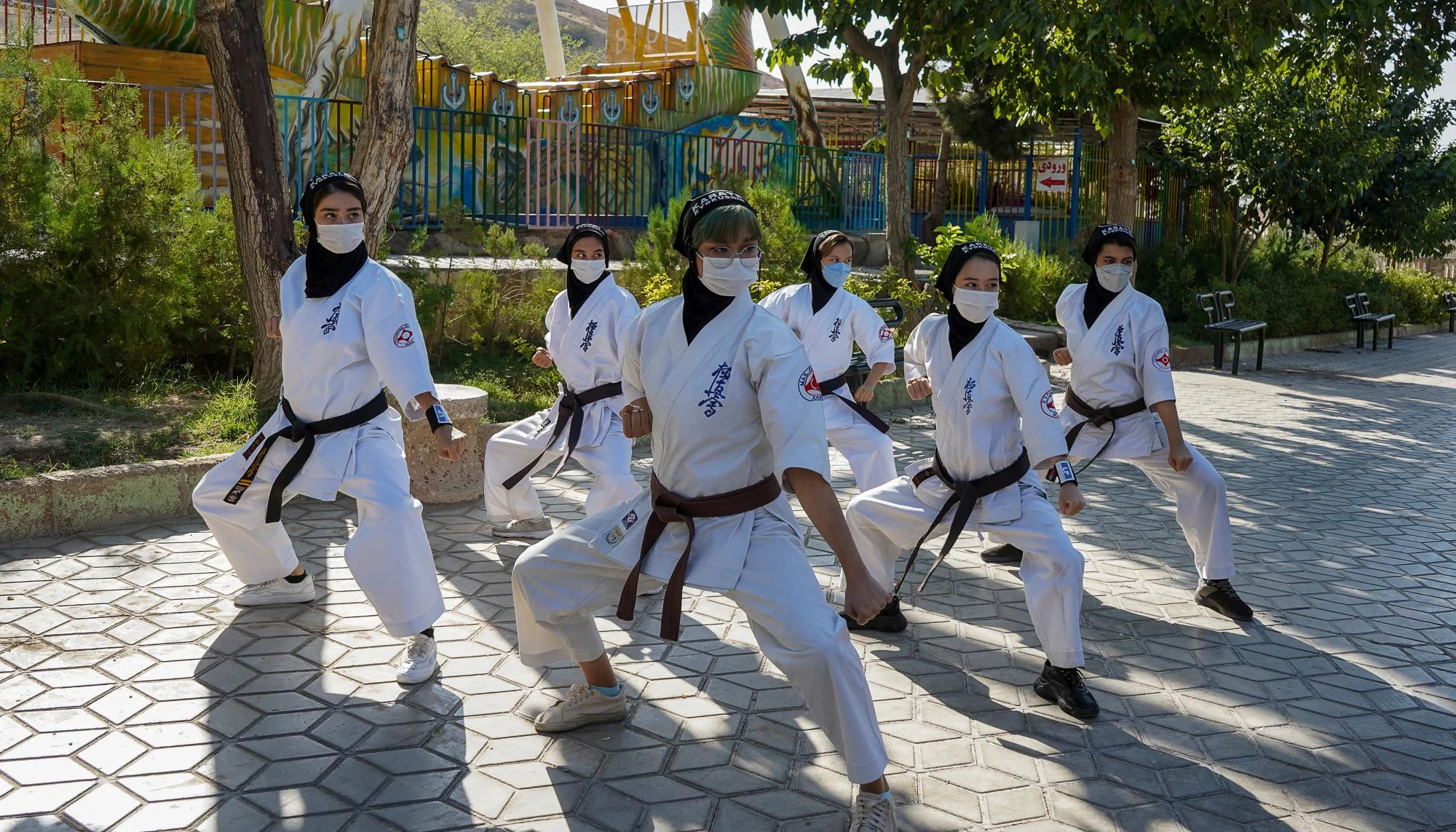‘It’s more than martial arts – we teach courage‘: the Afghan sisters honing karate skills in Iran
By Deepa Parent
Copyright yahoo

Shokoufeh Jafari was only two when her family fled Afghanistan. In August 1998, as the Taliban closed in on the Bamiyan valley and targeted families of former military personnel, the Jafaris crossed the border into neighbouring Iran in search of refuge.
Now 29, Shokoufeh and her sisters, Maryam, 23, and Mandana, 20, have built a life in the city of Shiraz defined by resilience and a passion for Kyokushin karate.
Shokoufeh acts as a referee at a provincial karate competition in Shiraz in July 2022, as one of her students eagerly waits for their match to begin
Shokoufeh began training at 13, followed by Maryam at seven and Mandana, who was nine. Shokoufeh recalls how their father, a former military officer, encouraged them to pursue the sport, believing it would build their confidence and strength.
Shokoufeh and her father look at old pictures from their life in Afghanistan
“Our father was the only one who believed in us from the very beginning. He enrolled us in private karate classes because it wasn’t offered at school. We never trained in Afghanistan, but with his support we were able to practise in Iran, join the [Afghan] national team, and compete internationally,” she says.
“Karate became a shared language for us, one that strengthened not only our physical power but also our spirit and will,” adds Maryam.
Maryam rests on a bench after an intense bout at a karate competition
“In a society that grows more patriarchal every day, having a father who unconditionally supports his daughters is truly a great blessing,” says Mandana. Shokoufeh remembers the thrill of her first official national tournament win, recalling watching her proud father holding up the trophy. Their crowning achievement came in 2019 at the Asian Kyokushin Karate Championship in Shiraz, the first time all three sisters participated in an international tournament. “That day I realised karate wasn’t just a sport for us, but also about family and support,” says Mandana.
We have always deeply empathised with Iran’s brave women – my wish is that one day all women can live free and equal livesMaryam Jafari
But the Taliban’s return to power in August 2021 shattered their dreams of ever returning home to train and compete. All organised sports for women in Afghanistan were halted.
“I recall waking up that morning and hearing that Kabul and then all of Afghanistan had fallen,” Shokoufeh says. “My body felt frozen. Despair consumed us, and for months we prayed that everything would be fixed, that Afghanistan would be freed. But that hasn’t happened. The education and dreams of thousands of girls like us in Afghanistan have been destroyed.
Maryam nurses an injury during a karate competition
“It was as if our efforts, our achievements and our future were erased overnight.”
While Iran has offered them a degree of freedom, it has never felt like home, says Maryam. “The lack of official citizenship causes many problems and makes us feel like we don’t fully belong anywhere,” she says.
“I’ve lived here for years, gone to school, trained in sports, even have Iranian friends, but there has always been an invisible border between us and others,” she says.
Maryam honours her connection to her culture and family roots by wearing traditional Afghan clothing and makeup
The past few months have been especially harsh, as Iran has intensified deportations of Afghan migrants, forcing many families to leave without warning. Between 1 June and 23 July this year, an estimated 800,000 undocumented Afghan refugees and migrants were returned from Iran, of whom 153,000 were women, according to the International Organization for Migration (IOM).
Amid growing anti-Afghan sentiment in Iran, Mandana says she faces harassment in the streets and heightened police scrutiny. “I go out every day with fear. My mom always tells me, ‘Take your documents with you and come back quickly’.”
Their mother worries constantly. “She calls or messages dozens of times a day,” says Shokoufeh. “She fears for us, for our students, for every Afghan girl.”
Maryam, Shokoufeh and their mother wash carpets as part of the traditional spring cleaning (khaneh-takani) before Nowruz, the Persian new year
Despite the uncertainty and anxiety, the sisters continue to run a small dojo [training centre] on the outskirts of Shiraz, giving Afghan girls a space to learn karate. Shokoufeh describes it as “a place where we teach more than martial arts; we teach courage, resilience and self-belief”.
At home, the sisters’ environment is steeped in Afghan culture. Their house is decorated with traditional carpets, walls decked in paintings and the Afghan flag. As a close-knit family of seven, including two brothers, they gather often to celebrate birthdays and weddings, and their barbecues feature traditional Afghan clothing and dancing to Afghan music. “Even though we haven’t lived in Afghanistan,” Shokoufeh says, “our parents ensure that Afghan culture is alive in our home. It’s our way of keeping our identity intact.”
Related: ‘They threw us out like garbage’: Iran rushes deportation of 4 million Afghans before deadline
Outside the dojo, the sisters pursue other passions. Shokoufeh studied law but could not practise due to her Afghan migrant status. She enjoys fitness training, cooking, embroidery and nail art. Maryam balances reading and academic research in genetic medicine with painting, writing and studying foreign languages. Mandana finds calm in art and music, while also cultivating her love for robotics and programming.
Clockwise from top left: the Jafari family cook kebabs during a picnic in a park in Shiraz; Shokoufeh and Maryam play cards with their 16-year-old brother Masoud; Maryam dusts as part of the traditional new year cleaning; the sisters perform a traditional Afghan dance to celebrate their brother’s birthday
The sisters also feel inspired by the fight for women’s rights in Iran. Maryam says: “We have always deeply empathised with Iran and its brave women. My wish is that one day all women, everywhere in the world, can live free and equal lives.”
Despite the deportations, racism and cultural marginalisation, the sisters continue to stand firm, teaching, training and advocating for Afghan girls in Iran.
“With the Taliban in power, Afghanistan has become unsafe and even dangerous for girls like me and my sisters,” Shokoufeh says. “Sometimes I feel we have nowhere left to go. Exile becomes not just a place, but a constant feeling, like you always have to prove your right to exist.”
But, she adds, “Even when we have no home, we can make our hearts a home for hope.”
Maryam in traditional Afghan dress



